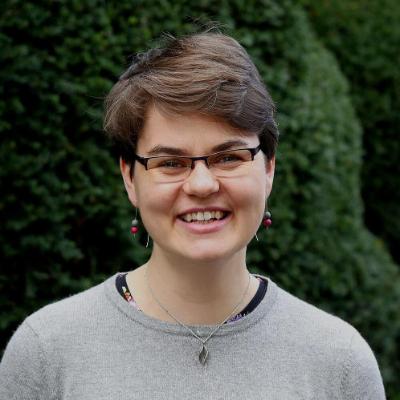Dr
Astrid Breel
- Impact Research Fellow
- Email: a.breel@bathspa.ac.uk
- Telephone: +44 (0)1225 875859
- Department: Research and Enterprise
- Campus: Corsham Court

Personal statement
Astrid Breel is a Performance Studies researcher who explores participation, agency and meaning-making processes.
She is interested in the reasons people have for taking part in events and projects (from theatre to research), how their experiences become meaningful for them, and how we can capture these meaningful experiences in a way that does justice to them.
Her interdisciplinary and multi-modal approach includes performance analysis, audience research and practice research methods to expand contextual perspectives. Her interdisciplinary work on research impact and engagement highlights the contribution that Performance Studies can make to other research disciplines and impact practices.
Emergent Value
Astrid’s innovative approach to audience research on live performance led to an Arts and Humanities Research Council funded Research, Development and Engagement Fellowship to explore Emergent Value as a novel concept to better understand meaning-making in live performance.
Emergent Value describes the personal ways that audience members ascribe meaning to their experiences. It arises out of the person-specific connections between elements of the performance and the experiences and ideas participants carry with them. Emergent Value is:
- Participant-led (they decide what is meaningful)
- Non-instrumental (outcomes are not pre-determined)
- Participant-centred (reflection processes designed to be interesting/fun for participants, who are then asked if they’re happy to share any parts)
- Embedded (the evaluation strategy is part of the overall experience)
Evaluation and audience research strategies will be developed and tested as part of the project, with the aim to set up a framework for Emergent Value and an associated Evaluation Playbook.
The project is a collaboration with Coney, Pudding, MAYK and Trinity Community Arts.
Agency in experiential performance
Astrid’s research on participatory and experiential performance forms focuses on agency and aesthetic experience.
Her research argues the fundamental interconnectedness of ethics and aesthetics in participatory performance. It sets out four aesthetic elements of participatory performance and explores how agency becomes meaningful in participation.
She has developed an empirical audience research method for analysing the aesthetic experience of participatory performance practices (published in Vol.12:1 special issue of Participations: Journal of Audience and Reception Studies) and collaborated with internationally renowned practitioners in applying this method.
She has also developed a contextual approach to agency that highlights that agency needs to be experienced to be meaningful. (Breel, 2022a; 2022b; and forthcoming in Studies in Theatre and Performance)
Current projects
- Emergent Value (2023-2025): An AHRC-funded Fellowship project to develop a framework around Emergent Value with associated participant-centred evaluation strategies. This framework enables scholars to rethink how we determine the value of arts experiences, which is essential at a time of increased pressure, and provides tools and metrics so that researchers can better articulate the value of the arts. The project's innovative methodology captures the individual ways audiences ascribe meaning and value to their experiences (for instance through connections to their lived experiences). This can be embedded alongside more common instrumentalist approaches to evaluating the value of arts engagement (where the potential values are predetermined).
- AHRC Impact Accelerator Account (2022-2026): Astrid is the Co-I on this devolved funding award to develop Bath Spa’s impact culture and support engaged and impactful research projects. She co-ordinates internal funding calls, leads the development of postdoctoral projects, advises researchers on evaluation techniques, and carries out research that highlights the innovative nature of Arts and Humanities led impact and engagement practices (building on my expertise in participation)
- Telling Our Story: The Cultural Confidence Scale (2023-2024): A collaborative project with Trinity Community Arts to develop their Cultural Confidence Scale into a practical method for understanding the experience of their participants and audiences. To co-create better ways of telling the stories of the many people who use, access and deliver activity at Trinity.
- Codename: Seedling (2024-2026): An international collaborative project with the Vrije Universiteit Brussel and creative partners in Belgium, Denmark, UK, Portugal and France; funded through Erasmus+. The project explores how young people can better engage with the climate crisis through arts activities, working through youth-led projects that combine activism, education and the arts to develop arts-based advocacy toolkits for practitioners. Astrid is developing an embedded reflective strategy and designing an impact strategy that demonstrates the efficacy of the creative projects and toolkits.
Academic qualifications
- PhD in Performance Studies - University of Kent.
- Postgraduate Certificate in Higher Education - University of Kent.
- MA - University of Chester.
- BA (Hons) - University College Chester.
External roles
- Associate of Coney
- Member of artist-led organisation Residence in Bristol, UK.
Areas of expertise
- Performance studies (particularly participatory and experiential performance forms, digital performance and interactive dramaturgy)
- Audience research (with a focus on mixed-methods)
- Agency (in an interdisciplinary context)
- Impact and evaluation (in relation to arts and cultural experiences and from Arts and Humanities research).
Contact me about
- How to engage people meaningfully in your research
- How best to capture research engagement and impact.